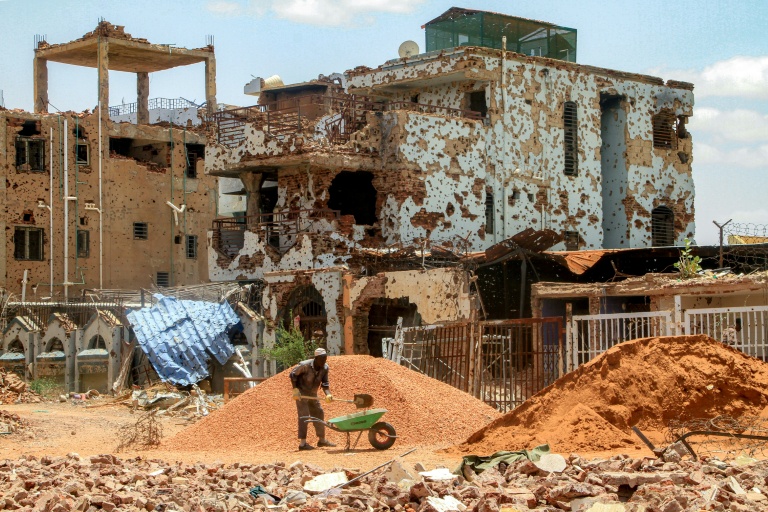World
Builders Begin Reconstruction of War-Torn Khartoum Amid Challenges

On the streets of Khartoum, builders have initiated the first reconstruction efforts since the conflict erupted over two years ago. This marked a significant step toward restoring essential services in the war-ravaged capital of Sudan. The fighting, which began in April 2023 between Sudan’s army and the paramilitary Rapid Support Forces (RSF), has left the city in dire condition, prompting government agencies and youth-led volunteer groups to join forces in the rebuilding effort.
As workers clear rubble from buildings riddled with bullet holes, they are also hauling away fallen trees and repairing damaged power lines. Volunteer Mostafa Awad emphasized the importance of restoring the state’s infrastructure, as Khartoum, once a bustling metropolis of nine million residents, now stands as a shadow of its former self. The skyline is marked by collapsed structures and debris, with electrical poles leaning precariously or lying broken in the streets.
The situation remains perilous, as authorities face the daunting task of clearing tens of thousands of unexploded ordnance left by the conflict. The United Nations has warned that Khartoum is “heavily contaminated by unexploded ordnance,” with reports of landmines discovered throughout the capital. The ongoing conflict has resulted in tens of thousands of deaths and displaced approximately 13 million people, contributing to one of the world’s worst humanitarian crises.
The war turned Khartoum into a battlefield, displacing around four million residents before the army pushed the RSF out of the city in March. During this time, the RSF systematically looted infrastructure, taking everything from medical supplies to essential utility components. Luca Renda, the UN’s resident and humanitarian coordinator, noted the unprecedented scale of destruction. “All the cables have been taken away from homes; all the pipes have been destroyed,” he explained.
Power and water systems remain critically damaged. Mohamed al-Bashir, the head of the electricity department in eastern Khartoum, reported “massive damage” to the capital’s main transformer stations, with some completely destroyed during the conflict. Inadequate electricity supply and a lack of reliable water have led to public health crises, including a cholera outbreak that saw up to 1,500 new cases a day reported in June, according to the UN.
In a bid to restore normalcy, Sudan’s Prime Minister Kamil Idris visited Khartoum last month and pledged a comprehensive recovery effort. He stated, “Khartoum will return as a proud national capital.” Even as the conflict continues in other parts of the country, the government is planning its return from Port Sudan, where it was relocated during the war.
A significant initiative announced this week involves the evacuation and redesign of central Khartoum, where some of the fiercest battles occurred. The UN estimates that rehabilitating the capital’s essential facilities will require around $350 million, while complete reconstruction may take years and cost several billion dollars, according to Renda.
As hundreds of volunteers and construction workers engage in the arduous task of rebuilding, they face several challenges. Mohamed El Ser, a construction worker, highlighted the difficulty in sourcing raw materials such as infrastructure tools, sanitation supplies, and iron. Despite these challenges, he noted that the market is beginning to recover.
In downtown Khartoum, workers can be seen stacking bricks beside crumbling structures and carefully refitting pipes in what were once family homes. On a road that had served as a front line, individuals repaired downed streetlights while others cleared debris.
The UN anticipates that by the end of the year, up to two million people may return to Khartoum. Those who have already come back, estimated to number in the tens of thousands, express cautious optimism about the gradual improvements in living conditions. Ali Mohamed, a recent returnee, remarked, “Honestly, there is an improvement in living conditions. There is more stability now, and real services are beginning to come back, like water, electricity, and even basic medical care.”
As Khartoum begins its slow recovery, the resilience of its people shines through the rubble and chaos, hinting at a future where the capital may once again thrive.
-

 Science2 months ago
Science2 months agoToyoake City Proposes Daily Two-Hour Smartphone Use Limit
-

 Health2 months ago
Health2 months agoB.C. Review Reveals Urgent Need for Rare-Disease Drug Reforms
-

 Top Stories2 months ago
Top Stories2 months agoPedestrian Fatally Injured in Esquimalt Collision on August 14
-

 Technology2 months ago
Technology2 months agoDark Adventure Game “Bye Sweet Carole” Set for October Release
-

 World2 months ago
World2 months agoJimmy Lai’s Defense Challenges Charges Under National Security Law
-

 Technology2 months ago
Technology2 months agoKonami Revives Iconic Metal Gear Solid Delta Ahead of Release
-

 Technology2 months ago
Technology2 months agoSnapmaker U1 Color 3D Printer Redefines Speed and Sustainability
-

 Technology2 months ago
Technology2 months agoAION Folding Knife: Redefining EDC Design with Premium Materials
-

 Technology2 months ago
Technology2 months agoSolve Today’s Wordle Challenge: Hints and Answer for August 19
-

 Business2 months ago
Business2 months agoGordon Murray Automotive Unveils S1 LM and Le Mans GTR at Monterey
-

 Lifestyle2 months ago
Lifestyle2 months agoVictoria’s Pop-Up Shop Shines Light on B.C.’s Wolf Cull
-

 Technology2 months ago
Technology2 months agoApple Expands Self-Service Repair Program to Canada









